Publications
IfM Bonn publishes its research findings primarily in its publication series: study results are published as "IfM-Materials" - or in condensed form as a "Denkpapier" (summary). Statistical analyses and results appear in the series "Daten und Fakten". Discussion and technical papers from all research areas are published as "Working Papers".
In addition, until 2012 selected articles were published in the series "Schriften zur Mittelstandsforschung" (Gabler Verlag). Under the "External Publications" tab, you find numerous essays by IfM researchers that have appeared in (peer-reviewed) specialist journals and external publication series.
555 Results
External publication | 2010 Duration of regular insolvency proceedings of companies
This article provides information on the time period that creditors in insolvency proceedings have to wait for a distribution from the debtor's assets. On average, regular insolvency proceedings against legal entities last four years, and those against natural persons two years.

IfM-Materialien | 2009 BDI medium-sized companies panel 2009
In the context of a long-term study on industrial SMEs in Germany, the IfM Bonn has been surveying a fixed group of industrial companies twice a year since 2005.

Working Papers | 2009 Job dynamics and sustainable employment effects in small and medium-sized enterprises
According to the SME hypothesis, small and medium-sized enterprises (SMEs) make a higher contribution to the creation of new jobs subject to social security contributions than large companies, measured by their share of total employment.

IfM-Materialien | 2009 Sales and personnel policy in the craft trade sector in the face of demographic change
In the coming years the German resident population will age strongly, which will not be without consequences for the sales, procurement and job markets. A goal of the present study was it to examine the specific situation of the handicraft in this demographic revolution process.

IfM-Materialien | 2009 Family-External Succession in the Free State of Saxony: The Finding of Handers and Takeovers
With a total of 1,700 to 2,700 family businesses affected, the Free State of Saxony has the most succession arrangements in the new federal states, depending on estimates. Succession solutions outside the family have become increasingly important in recent years.

IfM-Materialien | 2009 The quotas of insolvency creditors in regular and insolvency plan proceedings - Results of insolvency proceedings after the insolvency law reform
The reform of the insolvency law in 1999 was aimed at improving the satisfaction quotas of insolvency creditors and enabling more insolvent companies to continue as a going concern. An evaluation of the reform has so far been difficult due to a lack of representative data.
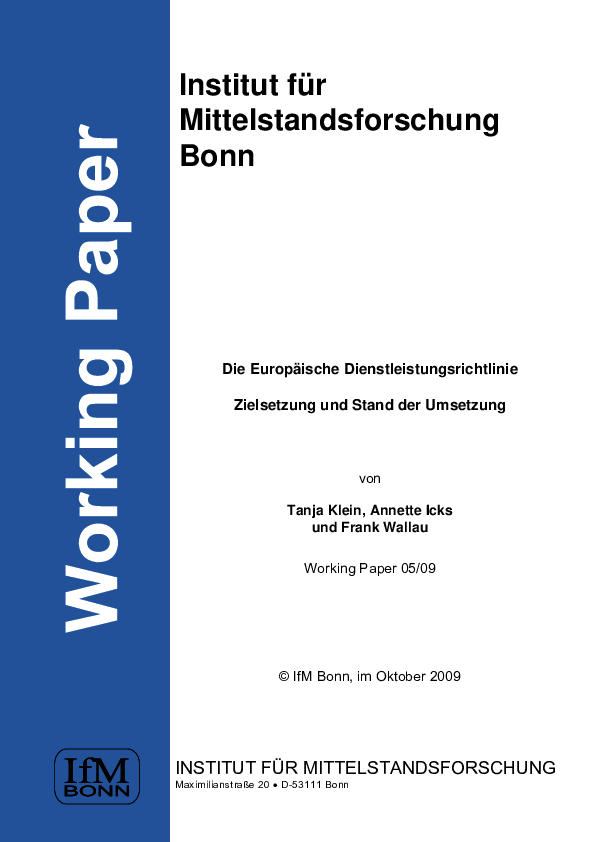
Working Papers | 2009 The European Services Directive Objectives and status of implementation
According to the plans of the European Union (EU), the European Services Directive should be implemented in all European member states by the end of 2009. In order to simplify the practice of a service industry across EU countries, the nationwide establishment of so-called "points of single contact" is at the heart of the Services Directive.

IfM-Materialien | 2009 Development of the foundation and liquidation process in NRW
In the following, the founding and liquidation events in NRW are processed specifically on the basis of the available statistics on founding and liquidation events in the corporate sector.
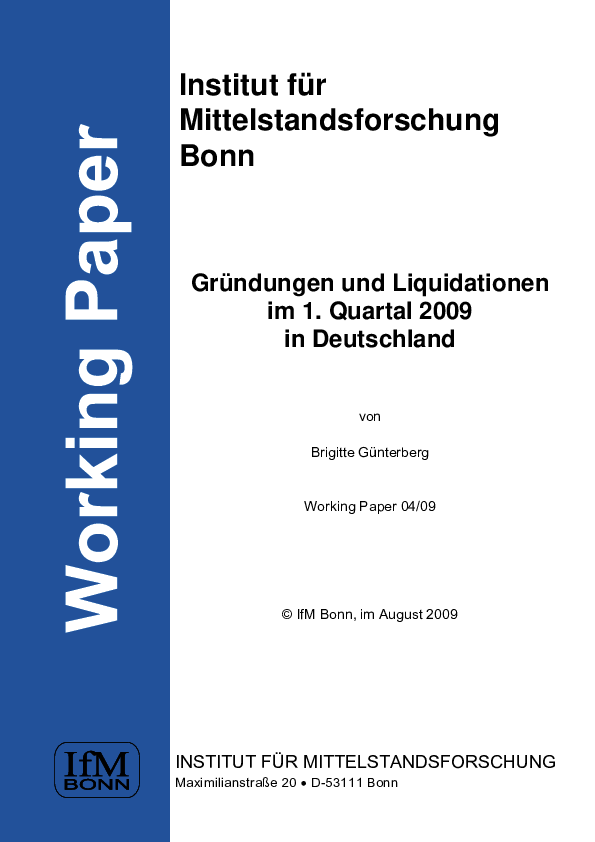
Working Papers | 2009 Foundations and liquidations in the 1st quarter 2009 in Germany
Foundations, liquidations and insolvencies are important elements of economic dynamics. However, Germany lacks official statistics on start-ups and liquidations. Therefore, the IfM Bonn regularly compiles its own statistics based on the business advertisement statistics of the Federal Statistical Office.
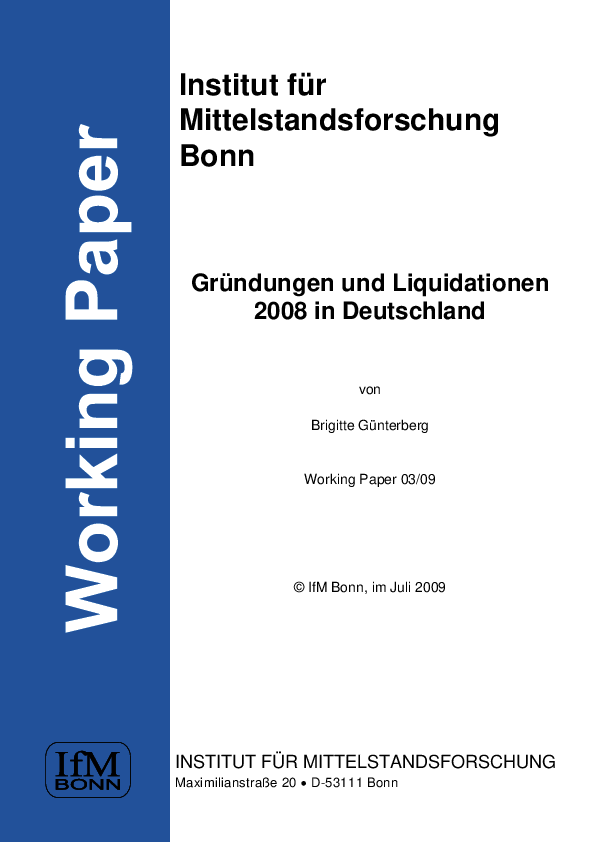
Working Papers | 2009 Foundations and liquidations 2008 in Germany
Foundations, liquidations and insolvencies are important elements of economic dynamics. However, Germany lacks official statistics on start-ups and liquidations. Therefore, the IfM Bonn regularly compiles its own statistics based on the business advertisement statistics of the Federal Statistical Office
Schriften zur Mittelstandsforschung | 2009 Corporate Social Responsibility as a success factor of a stakeholder-oriented management strategy? Results of an empirical study
In the expert discussion on Corporate Social Responsibility (CSR), it is assumed that the voluntary pursuit of public-interest objectives brings competitive advantages to companies. However, the evidence of success of this management concept has so far been limited to positive case studies.
Schriften zur Mittelstandsforschung | 2009 Can potential start-ups close the so-called succession gap in company takeovers?
Small family-owned companies are affected more than average by closures due to a lack of (internal or external) successors. According to the recommendations of various authors, one way to counteract this is to increasingly attract people who are looking to start a new business (potential founders).
Schriften zur Mittelstandsforschung | 2009 Barriers to SME Access to Promotion of Foreign Trade and Investment - Some evidence from Germany
The aim of state foreign trade promotion is to reduce the size-related structural barriers to small and medium-sized enterprises in internationalizing their business activities. These include limited management capacities and limited organizational potential. These structural barriers mean that many SMEs find it difficult to establish their foreign business without neglecting their day-to-day business in their home market.
Schriften zur Mittelstandsforschung | 2009 Self-management as an instrument for the continuation of the company in insolvency proceedings
In 1999, the insolvency law was reformed with the aim of increasing the chances of insolvent companies to continue their operations. Reorganization options are on the one hand the own or external reorganization in the insolvency plan procedure and on the other hand the transferred reorganization in the regular procedure.
External publication | 2009 Demographic change and the sales-political adaptation measures of small and medium-sized enterprises
The ageing of the population in Germany will lead to a significant change in the sales markets in the near future. Since small and medium-sized enterprises (SMEs) rarely practice strategic management systematically, it can be assumed that SMEs will be less active in adapting to future changes.
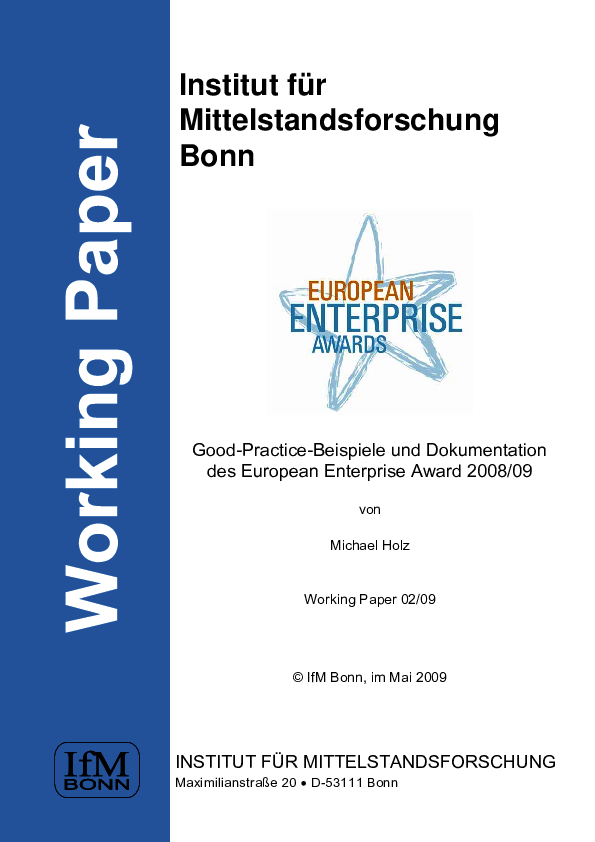
Working Papers | 2009 Good practice examples and documentation of the European Enterprise Award 2008/09
With the European Enterprise Award, the European Commission honors outstanding achievements of public institutions and public-private partnerships. In order to make the initiatives and practice models known nationally and internationally, the IfM Bonn, which supervised the competition as the national contact point, prepared a documentation of the 2008/09 competition round.

Working Papers | 2009 Foundations and liquidations in the 1st to 3rd quarter 2008 in Germany
Foundations, liquidations and insolvencies are important elements of economic dynamics. However, Germany lacks official statistics on start-ups and liquidations. Therefore the IfM Bonn regularly compiles its own statistics based on the business advertisement statistics of the Federal Statistical Office.

IfM-Materialien | 2009 BDI Panel for medium-sized businesses 2008
In the context of a long-term study on industrial SMEs in Germany, the IfM Bonn has been surveying a fixed group of industrial companies twice a year since 2005. In addition to an assessment of the current and future economic situation, the industrial companies are also asked to comment on topics relevant to daily politics and business management.
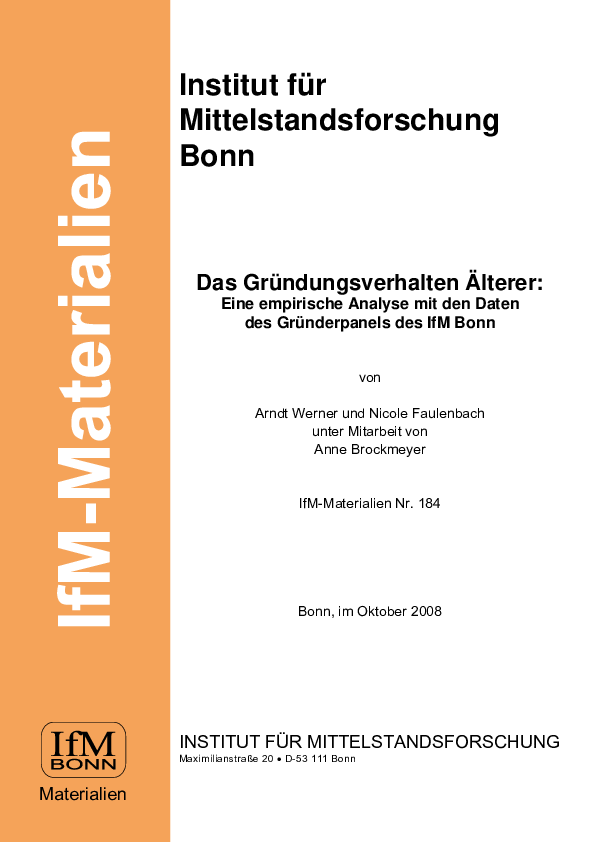
IfM-Materialien | 2008 The start-up behavior of older people: An empirical analysis with data from the IfM Bonn start-up panel
The population in Germany, as in almost all other industrial nations, will age considerably and shrink in numbers in the coming decades. This development, known as demographic change, will also have an impact on future business start-ups. This is because the age group of those over 45 years of age with a low foundation rate is constantly increasing, while at the same time the younger age groups with a high foundation rate are decreasing.

IfM-Materialien | 2008 Sales and personnel policies of medium-sized companies in the face of demographic change
The demographic development will lead to sustainable changes in the economy and society in the medium to long term. The aging and shrinking of the population in Germany will affect both the demand for goods and the availability and prices of production factors such as labor and capital.